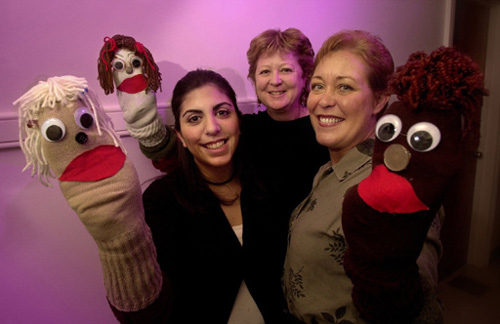Anthropology and sociology major Sylvia Anserian ’04 (River Edge, N.J.) and part-time student Lori Vitko tried to help children avoid eating disorders later in life by bringing a program to promote good body image and self-esteem to an Easton elementary school.
The pair presented a half-hour puppet show and discussion to three fourth-grade classes at March Elementary School in early April. The project was part of an independent study course with Deborah Byrd, associate professor of English, who also taught the students in a Women’s Studies class that inspired the idea.
They also unveiled their creation at the Eighth Annual Undergraduate Women’s Studies Conference at DeSales University, Center Valley, Pa., sponsored by the Women’s Studies Coalition of the Lehigh Valley Association of Independent Colleges.
“During one of our discussions dealing with eating disorders, many women in the class confessed to their own past encounters with this serious problem,” says Anserian. “After listening to one story after the next, I proposed to the class that although the problem was clearly stated, we had yet to develop a solution.”
Byrd’s citing a statistic that more than 50 percent of fourth grade girls are dieting and/or believe they are too heavy sparked a realization that eating disorders begin early on.
“We decided to develop a program focusing on positive body image among fourth-grade students, by using as a model the national program DARE. The program ‘CHAT’ was born,” says Anserian.
CHAT stands for Children Happy About Themselves. The puppet show stars a girl who wants to be a pop star, but whose friends tell her she can’t be the next Britney Spears, according to Byrd.
In addition to learning about the subject matter, Byrd says, Anserian and Vitko had to think about their audience and ways to teach nine-year-olds within the structure of the public school system. “It’s been eye-opening,” comments the professor.
“We incorporated a boy puppet into the second show because we realized our audience would be both male and female,” notes Vitko. “They saw that you don’t have to be skinny to be a singer, or in a boy’s case, you don’t have to be big and muscular to be a wrestler. We showed them that it’s OK to be who you are and still have your dreams.”
Through their research, the Lafayette students learned that males deal with the same body image issues as females. Males have a condition called body dysmorphia that is “reverse anorexia,” notes Vitko. For example, a bodybuilder with rippling muscles looks in the mirror and believes he appears scrawny.
The presenters distributed worksheets after the performance and asked the students to state the purpose of the puppet show.
“Each class hit it on the head: You should be happy with who you are and anything you want to be,” says Vitko. “We were a little nervous that this wasn’t right age – that they might be either too young or too old – but it seemed to be perfect.”
The message of looking past appearances was reinforced at the end of each show when Vitko asked the class to identify which of the two presenters was the Lafayette student. After the children all chose Anserian because her appearance indicated that she was younger, Vitko announced that both of them were students.
Anserian says she is excited about taking a role in stemming a widespread problem. “I feel that my efforts with CHAT will make a difference in the lives of these youngsters and many others like them,” she says.
“We had a great working relationship and we both want to see the problem go away,” says Vitko. “The way the media bombards us with thinness and beauty, what we did is a drop in the bucket, but you have to start somewhere, and I feel we did that.”
Anserian adds that Byrd has encouraged her to take action on her ideas and clearly cares about her “not only as a student, but also as a human being.”
Anserian also has received a helping hand from counselors at Lafayette’s Health Center and psychology professors who have shared their expertise.
“Lafayette has provided me with a very supportive learning environment,” she adds.
A graduate of River Dell Regional High School, Anserian is vice president of Foundation for Delta Gamma and treasurer for Cadence, a female a cappella group. She is active in Adopt-a-Grandparent, Kids In the Community, and Habitat for Humanity, three volunteer programs run by the Landis Community Outreach Center.

Sylvia Anserian ’04 (left) and Lori Vitko (right) were inspired by Women’s Studies class of Deborah Byrd, associate professor of English, to do a puppet-show on positive body image for elementary school students.
